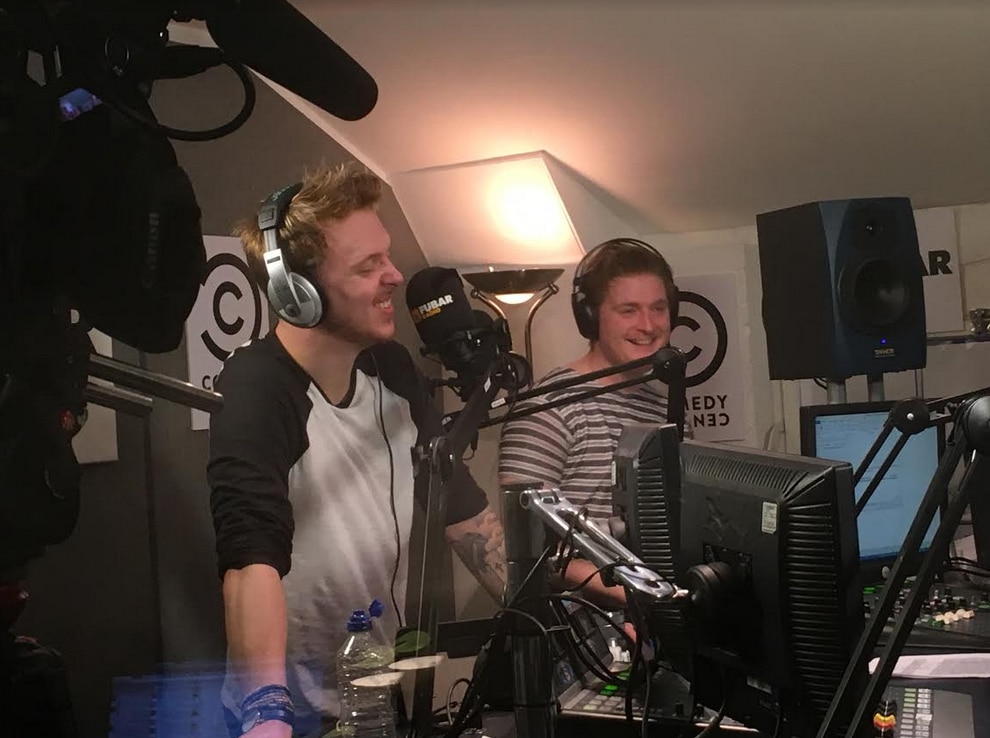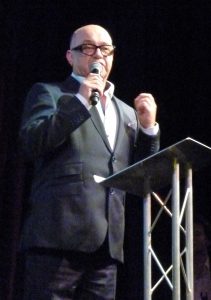At Crowdsourcing Week we are fascinated by the disruption taking place in many business sectors where established business models are being re-written. Entrepreneurs are identifying and exploiting opportunities provided by the global connectivity of billions of individuals which enables direct messaging and interaction.
I retain an affinity with the radio business after years spent in a top team that successfully promoted the generic benefits of radio advertising opportunities, and it is yet another business sector subject to new-entrant disruption.
The ethos of FUBAR Radio
These days, going anywhere without your smartphone is like leaving home undressed. A connected device close to hand is a physical – and for many people also an emotional – necessity. This is never more true than with young adults, the so called ‘smartphone generation’ of 18-34s is never offline. Although the UK has several well established talk-radio stations, none of them specifically target the 18 to 34 demographic. Mass scale digital connectivity provided a commercial opportunity.
FUBAR Radio launched in February 2014 as a disruptive digital entertainment brand with an aim to fill this gap in the market. Capturing this age group is notoriously difficult in any medium, so the content and the way it’s delivered were always going to be crucial if FUBAR was to grow its audience and establish its credentials by engaging with this usually difficult-to-reach demographic.
FUBAR operates solely as an online proposition – it can’t be found on DAB (Digital Audio Broadcasting), any terrestrial wavelengths, or satellite or cable. FUBAR is delivered through its own ‘App’ and website alongside social media channels like Facebook and Twitter. It also enjoys partnerships with major third party platforms, such as iTunes: FUBAR is an Apple Preferred Podcast Provider, which gives it considerable prominence on the popular iTunes homepages.
In the past some may have thought this to be a disadvantage, though rising levels of mobile digital connectivity meant that by 2014 it was in fact a deliberate way to avoid the normal regulations about broadcast content imposed by the UK watchdog OFCOM that constrain all other UK radio station content. FUBAR’s live speech-based programming can afford to be cheeky, irreverent and sometimes put out post-watershed adult content at any time of the day.
It also means they don’t have to tie themselves to a licence condition to focus on a specific topic such as music, sports coverage or business commentary – they can cover whatever they choose at any time and to achieve any balance of overall subject matter content. Add to this the complete absence of commercial breaks, news, travel or weather bulletins and it all makes for surprising and refreshingly engaging live talk-radio content.
Company founder and CEO Duncan Smith says “FUBAR’s great opportunity is to occupy a clear point of difference. Over the past decade, traditional media, like TV, radio and press have been commercially astute in making content accessible online. But they’ve obsessed too much with distribution and often ignored the relevance of the content itself. To some extent, you can get away with that for popular mainstream radio and TV material, but it doesn’t resonate with many younger audiences online – those who want something different and who increasingly ignore traditional media and most importantly [for brand owners] they miss the advertising within it.”
He also believes the enormity of change is not driven by technology alone. FUBAR responds to what he describes as a paradigm shift in consumer attitudes. “It can’t be as simple as repurposing existing content; audiences seek out original, edgy and relevant content presented to them by credible artists who emotionally connect with them. If you really want to connect with a younger demographic the content has to be fronted by individuals that use an authentic voice that resonates with that demographic.”
Programming format
Unlike traditional radio stations, FUBAR is not tied to daily live programming with shows lasting several hours from a handful of regular presenters. It has evolved into an integrated radio, video and social media offering that’s home to a range of very credible names in the UK music and comedy scene.
FUBAR has created a large library of spoken word audio content with over 75 artists who create weekly returning format series and box sets, rather than daily shows. In this way, there is an element of a Radio Netflix via the FUBAR Radio website, with the live daily schedule resembling something closer to UK television’s E4 or Channel 4, rather than any other radio station.
The station also uses video and audio clips disseminated through social media and its affiliates, to effectively ‘narrowcast’ to an audience, hooking them in with short attention span media. All of this drives an audience back to the point of origin and it’s proving to work very well indeed. This includes collaboration with key brand partners such as OK! (a celebrity gossip magazine) and the Viacom-owned television channel Comedy Central. These relationships drive additional audience through affiliated platforms.
And in FUBAR’s unregulated landscape anything can happen and pretty much anything can be said within a self-regulatory framework based on post-watershed tv content. This is enjoyed by the audience and presenters alike.
FUBAR’s marketing
Despite lacking a marketing budget comparable to the bigger players in this space, FUBAR gained significant launch coverage in 2014 by hiring big name hosts like celebrities Katie Price (aka former topless glamour model Jordan) and Andy Parsons, a leading British comedy writer and performer. It was an effective way to crowdsource a high level of free media exposure.
When Katie Price joined FUBAR, the news hit the front page of UK tabloid newspapers for several days, with publications like Heat Magazine (a celebrity-focussed magazine) stating that FUBAR was “a clever way of getting round the broadcasting regulations and full of addictively funny shows”.
The broadsheet newspapers also found the FUBAR proposition fascinating. The Guardian pointed to FUBAR becoming the “uncensored future of radio, with fierce PR and a string of high-profile hosts… broadcasting through an app on people’s phones, enables FUBAR to use more sophisticated tools to interact with listeners.” The Independent wrote “the UK’s first digital network dedicated to broadcasting no-holds-barred chat, comedy and content that could never be heard anywhere else” FUBAR is certainly a disruptive brand in the world of radio.
The ability to offer presenting talent complete creative freedom has continued to attract some big names in the UK music and comedy scene, many new to radio. These include Harley Sylvester from hip-hop duo Rizzle Kicks; BAFTA-winning actor and director Noel Clarke; YouTube sensation Hannah Witton; and the actor, comedian and rapper Doc Brown, who starred alongside Ricky Gervais in the film David Brent: Life on the Road.
Audience size
Over the last six months of 2016, FUBAR achieved an average monthly audience of 5.2 million and 93% were in the 18-34 age range, the station claims. This figure consists of unique users in a combined audience, consisting of live and on-demand audio, live and VOD clips, social media video and website editorial. FUBAR’s collaborations with other media brand partners such as OK! and Viacom-owned tv channel Comedy Central drive additional audiences through their affiliated platforms in the tens of thousands.
Business model
With a schedule of comedy, sports, arts and music programmes FUBAR offers a unique brand proposition, with content that appeals to the younger demographic and, more importantly, the brands that want to connect with that audience.
Programming can be sponsored like any other live radio. The big difference remains the content. It simply can’t be found anywhere else on live UK radio and brands are now waking up to this as they look to leverage FUBAR’s unique 360-degree content marketing opportunities.
With big-name presenters and social influencers providing what FUBAR calls “editorial advocacy,” FUBAR is attracting a lot of interest from brands that are looking to connect with the elusive 18 to 34 demographic. Having reached a critical audience mass, the company has begun taking the proposition out to brands to fully monetise the platform. FUBAR hope to soon announce securing a deal with fantasy sports betting company Draft Kings for its sport programming schedule in 2017.
Smith is excited by the fact that the company can look to a promising future revenue: “With hundreds of brands spending billions on content marketing in the UK, FUBAR’s access to influencer talent and the content that they actually want to create is crucial, and FUBAR is in a fantastic position to connect brands with a large 18 to 34 audience, not only from our audience but also affiliated from each artist’s huge social following.”
Next steps
The next stage of development for FUBAR is up-scaling its sales and marketing to deliver increased revenue from the sale of sponsorship and content marketing. This is a critical phase in the company’s development.
To jumpstart an enhanced sales and marketing effort, FUBAR is using equity crowdfunding running to 31 March 2017. As at 28 December 2016 the company had received pledges of £277,250 against a minimum funding target of £250,000, with an overfunding target of £500,000. The crowdfunding Executive Summary is here. Forecast revenue in 2017 was £1.7m based on achieving a 4m audience reach by Q2 2017 and an average monthly reach in 2017 of 5m, which they had already achieved by the back half of 2016. FUBAR will also bring app and web development in-house, achieving significant cost savings and triggering an R&D tax reclaim.







0 Comments